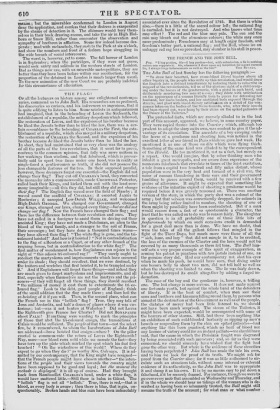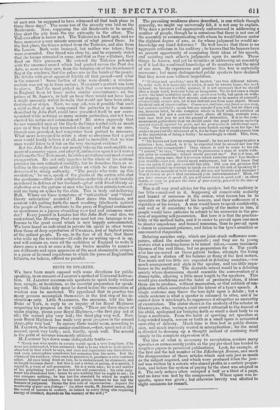THE FRENCH AND THE JOHN BULL.
Far. " I beg pardon, Sir—I beg pardon—but, with submission, a lie is nothing unless one supports it. Sir, whenever I draw upon my invention for a good current
lie, I always forge indorsements as well as the bill." TuE RIVALS.
THE John Bull of last Sunday has the following paragraph :— " To show how besotted, how stone-blind liberal bigotry above all other bigotry is, the people who write up this revolution, and would draw the English into a distinct interference by inducing them to subscribe in support of the revolutionists, tell us of the glorious sight of a child creep- ing under the horses of the gendarmerie, with a pistol in each hand, and deliberately murdering two men at a coup ; they dilate with satisfaction on the appearance of a woman literally torn to pieces for defending her husband, her limbs broken, and her mutilated body exposed through the- streets; and gloat with blood-thirsty satisfaction on a detail of the ven- geance taken on the bodies of the Swiss Guards, who, after their bowels had been ripped out, were hung by their chins on the spiked palisades of the Palace of the Tuileries."
The pretended facts, which are coarsely alluded to in the last part of this account, appeared, we believe, in some country paper. They were copied thence into the Courier ; which, although too prudent to adopt the story as its own, was content to give it the ad- vantage of its circulation. The anecdote of a boy creeping under the horse of a gendarme and shooting him, was noticed- in the excellent letter of our friend in Paris which we ;rave last week. He mentioned it as one of those on dits which were flying thick. Something of the same kind was alluded to by the correspondent of the Herald. He too mentioned it, not as a fact, but merely as a report. One would imagine, that by sober thinking men who inhabit a great metropolis, and are aware from experience of the numerous falsehoods that circulate in times of the least excitation, a tale from a capital two hundred and fifty miles distant, whose population were in the very heat and turmoil of a civil war, the noise of cannon thundering in their ears and their government tumbling to pieces arounethem, would be received with a few grains of allowance. It might be expected that something like evidence of the infantine exploit of shooting a gendarme would be required before it was gravely reasoned on. There was another version of the story, in which the party shot was a colonel of the army ; but that version was conveniently dropped, for colonels in the army being rather limited in number, the shooting of one of them might by possibility have been contradicted. But if a man would reason from a act of so questionable a character, the least that he was called on to do was to reason fairly. The slaughter in question is in all probability one of those little bits of fanfuronnade by which on such occasions credit is demanded for a great deal more than is done. We have no doubt, that were the tales of all the gallant fellows that mingled in the fight of the Three Days, but much more were those of all the "sick, lame, and lazy" that did not mingle in it, to be credited, the loss of the enemies of the Charter and the laws would not be covered by as many thousands as there fell tens. The Bull him- self sets a very proper example of this spirit of exaggeration, in arming his patriot in pinafores with two pistols instead of one, as the genuine story did. Had our contemporary not shut his eyes when he made his push, he would have seen, that diving under one horse's belly to shoot two men, did not tell half so well as when the shooting was limited to one. The lie was fairly drawn, but he has destroyed its credit altogether by adding a forged in- dorsat ion.
The case of the boy and the gendarme is, however, a trifling one. The last charge is more serious. It does not make against one fortunate youth, but against the whole band of the defenders of liberty. If in the heat of combat, when men saw their sons and brothers and kinsmen falling round them, by persons who aimed at the destruction of the Government as well as of the people, the dictates of mercy had been little listened to, we should not have been much surprised. The storm of the Tuileries, it might have been expected, would be accompanied with some of the horrors of other storms. Still, had there been anything like an exhibition of such cold-blooded barbarity as ripping up men's bowels or suspending them by the chin on spiked palisades—had anything like this been practised, which no heat of blood nor any licence of victory could for an instant palliate—we should have said, that the cause in which the Parisians fought was disgraced by being associated with such monsters ; and, so far as they were concerned, we should sincerely have wished that the fight had crone the other way. But where is the evidence of these atrocities having been perpetrated ? John Bull has made the tale his own, and to him we look for proof of its truth. We might ask for proof from the Courier also ; for it was as little authorized to cir- culate such an atrocious tale, without some internal or external evidence of its authenticity, as the John Bull was to appropriate it and stamp it as his own. It is by no means easy to put down a falsehood, if it be securely framed. For instance, though we were to. go over every mob that assembled on Wednesday and Thursday, and if in the whole we should hear no tidings of the womartwho is de- scribed as having been so inhumanly treated, the Bull might still. assume the truth of the account; for what man or what number of men can be supposed to have 1.Vitnessed allthat .took place in these three days? The scene too of the atrocity was laid on the Boulevards. Now, supposing the old Boulevards to be meant, they skirt, the city from the one extremity to the other. The Tuileries affair is easier Met. The Tuileries is a fixed spot, and we have moreover a very minute account of What passed there. In the first place, the troops retired from the Tuileries, and also from the Louvre. Both were besieged, but neither was taken ; they were evacuated, Our friend was close by, and he expressly states that the troops retreated in array, and that as they withdrew, they fired on their pursuers. He entered the Tuileries pell-mell with the unarmed crowd which had pushed across the Pont des Arts, as soon as they saw, from the hanging out of the tri-coloured flag at the windows, that the palace was in the hands of the people. He details with great apparent fidelity all that passed-and what is the amount ? Some bottles of wine were drunk ; a window- curtain was cut up to form sashes ; MARMONT'S portrait was torn to pieces. Had the most picked mob that ever was congregated in England been let loose under similar circumstances on the palace of St. James's, in half an hour there would not have been a single moveable within its walls that would not have been either destroyed or stolen. Now, we may ask, Was it possible that such a sight as that of men hung round the palisades in the manner described by John Bull, could have presented itself to our corre- spondent while noticing so many minute particulars, and not have excited his notice and astonishment ? He states expressly that he saw wounded men of' the Garde du Corps tended with as much care as if they had been wounded citizens ; and that in no case, though Sore provoked, had vengeance been pushed to massacre. 'What more is required to refute a story so atrocious that a good man would hardly believe it at all, and so incredible that no wise man would listen to it but on the very strongest evidence ? But the John Bull does not merely take up the contemptible ru- mour of a country paper, and adopt it, and reason upon it as it were a leaf from the New Testament; he adds a gratuitous and most absurd exaggeration. He not only imputes to the whole of his contem- poraries his own unlimited credulity, but he describes them as re- velling in the enjoyment of the fables on which he alone has en- deavoured to stamp authority. "The people who write up this revolution," he says, speak of the glories of the urchin who shot the gendarme—dilate with satisfaction on the tale of a wife brutally murdered in defence of' her husband—gloat with blood-thirsty sa- tisfaction over the picture of men who have their entrails torn out, and are hung on spikes by the chin. This is truly out-bellowing Bull. Where are these symptoms of "satisfaction" and "blood- thirsty satisfaction" recorded ? How dares this traducer, not content with putting forth the most revolting falsehoods against the people of France, attribute to the press of England sentiments so monstrous as a joyous chuckling over foul and infamous mur- der? Every journal in London but this John Bull—and also, we understand, the Morning Post—has used but one language in re- ference to the great event which is now happily consummated. We have heard no individual in private life speak in other terms than those of deep reprobation of CHARLES, and of highest praise of the gallant people. To say, in the face of all fact, that those who write up the revolution—(it calls for no writing up—it is up, and will remain so, were all the scribblers of England to write it down once a week or once a day for twelve months to come)— are deliberate and open approvers of the most abominable crimes, is a piece of licensed impudence to which the press of England has hitherto, we believe, offered no parallel.



























 Previous page
Previous page